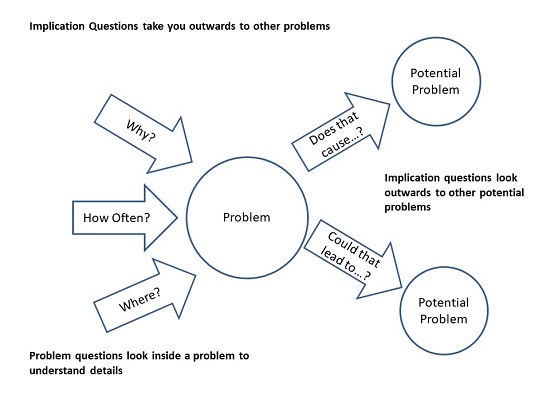Sell high end, complex products or services to senior decision makers?
Decision makers want to feel you truly understand them and the outcomes they want. Both on a personal and business level.
You accomplish this is by doing your research to find out what issues they may be facing. Equipped with this you bring new insights and approaches to your prospects. New ways of thinking. You’re collaborative in your approach. Senior buyers want to meet with you as they get real value from the interaction.
Once in front of a prospect, you delve deeply into their issues through questions which uncover needs, both explicit and implicit and the consequences of getting their desired outcomes or not. And then to show how your products/services will serve them.
Given this there are four broad categories of questions.
- Situation
- Problem
- Implications & consequences
- Needs & payoff
Situation Questions:
Situation questions delve into facts about the buyer’s existing situation. For example a welding machinery supplier might ask:
- What sort of welding do you do?
- How many people do you employ at this location?
- How many welding machines do you have?
But beware! These are shallow questions. Buyers don’t want to waste their time answering basic questions a few Google searches will uncover. So do your homework!
Problem Questions: We’re starting to dig beneath the surface here.
Remember, no problem equals no sale.
Successful salespeople think in terms of the problems they solve for buyers. They hone in on issues, difficulties or dissatisfactions that the buyer is experiencing with the existing situation.
For example:
- What prevents you from producing a product with lower return rates?
- Why do you find it hard to recruit skilled people?
- Is any part of the process costing more than you’d like?
Implication Questions. Digging deeper!
Okay, your buyer acknowledge there’s a problem. But is it worth solving?
What are the consequences if not solved? What benefits would accrue if they did?
Some are obvious while others are not. Your job is to help your prospects articulate these.
For example: “What happens if you can’t hire the right people at the right time?”
They may reply that they can’t service their clients. Which leads to unhappy clients. Leading to losing business and a bad reputation. Eventually they fold. And of course the opposite applies if they can find the right people at the right time utilising your services.

Having a prospect truly understand the implications of the issue both personally and for their organisation is key to moving a sale forward.
Need/Payoff Questions: Getting to the bottom of the swamp.
You can’t convince someone to buy. They have to convince themselves they want the solution.
Your job is to create the environment where they will by cementing the value and usefulness of your solutions in your prospect’s mind. How much could they make or save by implementing the solution now. How specifically would an improvement in production quality impact on the bottom line?
Payoff questions are a mirror image of implication questions.
For example an implication question might be”
“Could the higher return rate of your products add to your costs?”
Whereas a needs payoff question might be:
“If you had lower return rates would that cut costs and improve profitability?”
Wrapping up, to be successful in the sales game you must prove you have a deep understanding of your target market’s issues and be able to bring new insights to them.
That is a prerequisite to even getting to first base.
Wrapping up, one of the best ways to glean market intelligence and be relevant is to ask your current clients why they buy from you!
Our Value Gap Analysis (VGA) method will give you the tools to highlight what’s really important to your clients, where value gaps could exist and how to fix them.
You can read more about this here.
Rashid & Barbara.
And… Want to improve you & your sale team’s performance when selling complex B2B deals? We can coach and train your team one on one or as a group. Contact Rashid on 0414 913 334 for more details.
